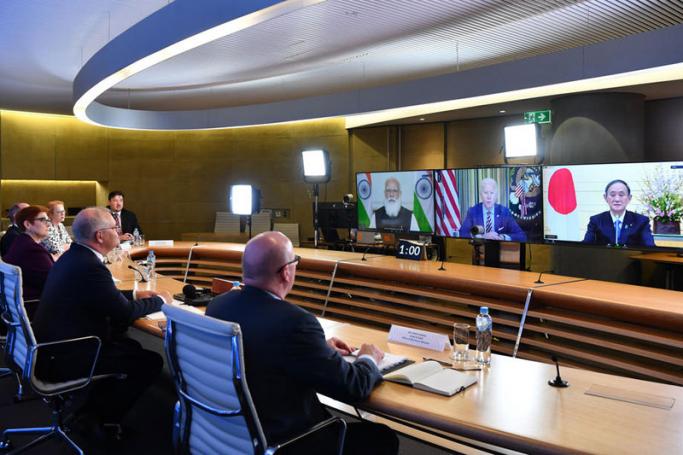Leaders of the United States, India, Japan and Australia held a virtual summit last week in which they called for a restoration of democracy in Myanmar but fell short of condemning the coup or calling for a return of the elected National League for Democracy-led government.
A senior White House official said the goal of the Quad is to be a “new feature of regular diplomacy in the Indo-Pacific.” However, observers agree that it is a counter to China’s increasing foreign policy assertiveness and threat to the regional maritime status quo.
In a joint statement, Quad leaders broadly reaffirmed their “commitment to quadrilateral cooperation and the promotion of “a free, open rules-based order, rooted in international law to advance security and prosperity and counter threats to both in the Indo-Pacific and beyond.”
They pledged to respond to the economic and health impacts of COVID-19, combat climate change, and address shared challenges, including in cyberspace, critical technologies, counterterrorism, quality infrastructure investment, and humanitarian-assistance and disaster-relief as well as maritime domains.
Addressing concerns over China directly, the leaders also committed to “facilitate collaboration, including in maritime security, to meet challenges to the rules-based maritime order in the East and South China Seas”, particularly as reflected in the United Nations Convention on the Law of the Sea (UNCLOS).
While the statement emphasized the urgent need to restore democracy and prioritise strengthening democratic resilience in Myanmar it fell short of condemning the coup or calling for a return of the elected NLD government. Abhijnan Rej, Security & Defense Editor at The Diplomat, noted that though the joint statement was unexpectedly blunt on maritime security, “on Myanmar, on the account of India (and perhaps also Japan), the language was unsurprisingly toned-down.”
What the Quad agreed to do:
The Quad approved three priority areas of collaboration: health, climate change and critical and emerging technology and three working groups with clear mandates will form to implement these agendas. Respond to the economic and health impacts of COVID-19, the Quad Vaccine Group is the most developed initiative.
In a move that will immediately raise the Quad’s profile and impact, it was announced that Japan and the United States will finance manufacturing in India of the Novavax and Johnson & Johnson vaccines, with Australia handling the distribution among Southeast Asian and Pacific nations.
Who started the Quad
The Quad has its inception the four countries’ closely and successfully coordinated relief efforts in response to the 2004 Boxing Day Tsunami and raised hopes that this grouping could be the start of a new, permanent and powerful regional grouping of like-minded democracies. According to Australian political commentator David Spears, China made it clear they perceived the grouping as an attempt to contain its ambitions. Consequently, Quad meetings never reached leadership level and petered out.
A quad meeting was revived on the sidelines of the 2017 ASEAN summit in Manila and before being elevated to the ministerial level with foreign ministers meeting on the margins of the September 2019 United Nations General Assembly session in New York. Quad foreign ministers have since met twice: in-person in Tokyo in October last year and virtually last month. Last November, India invited Australia to join the India-Japan-U.S. Malabar naval exercises – the first military exercise involving all four Quad members.












